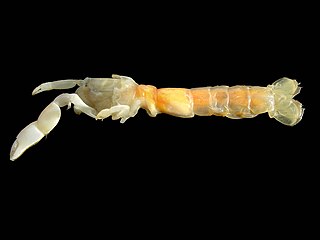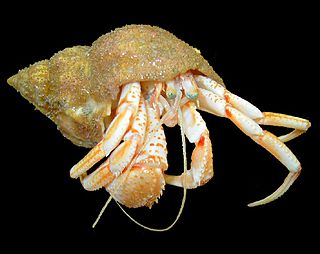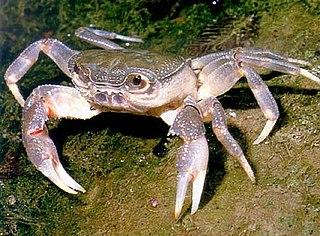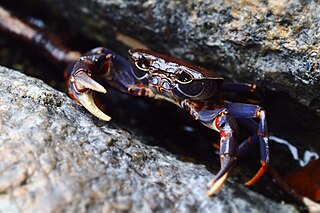
The Caridea, commonly known as caridean shrimp, are an infraorder of shrimp within the order Decapoda. They are found widely around the world in both fresh and salt water.

Panulirus is a genus of spiny lobsters in the family Palinuridae, including those species which have long flagella on their first antennae.

The Diogenidae are a family of hermit crabs, sometimes known as "left-handed hermit crabs" because in contrast to most other hermit crabs, its left chela (claw) is enlarged instead of the right. It comprises 429 extant species, and a further 46 extinct species, making it the second-largest family of marine hermit crabs, after the Paguridae.

Callianassidae is a family of ghost shrimp of the order Decapoda.

The Paguridae are a family of hermit crabs of the order Decapoda. This family contains 542 species in over 70 genera:

Potamidae is a family of freshwater crabs. It includes more than 650 species and nearly 100 genera, which are placed into two subfamilies: Potaminae and Potamiscinae.

Axiidae is a family of thalassinidean crustaceans. It includes the following genera:

Gecarcinus is the type genus of the land crab family Gecarcinidae. They are found in warmer coastal regions of the Americas, including islands in the Caribbean. Four species from oceanic islands were formerly included in Gecarcinus as the subgenus Johngarthia, but are now treated as a separate genus, Johngarthia. While all members of this genus are largely terrestrial, they have to return to the ocean to breed. They are often colourful, with reddish, orange, purple, yellowish, whitish or blackish being the dominating hues. This has resulted in some species, notably G. quadratus and G. lateralis, gaining a level of popularity in the pet-trade.

Paralomis is a genus of king crabs. It includes the following species:
Trichodactylidae is a family of crabs, in its own superfamily, Trichodactyloidea. They are all freshwater animals from Central and South America, including some offshore islands, such as Ilhabela, São Paulo. Only one of the 50 species is known from the fossil record, Sylviocarcinus piriformis from the Miocene of Colombia. The family contains 15 genera in two subfamilies:

Nematocarcinoidea is a superfamily of shrimp, comprising four families – Eugonatonotidae, Nematocarcinidae, Rhynchocinetidae and Xiphocarididae. They share the presence of strap-like epipods on at least the first three pairs of pereiopods, and a blunt molar process.

Dyspanopeus is a genus of crabs in the family Xanthoidea, comprising two species:

Callichirus is a genus of crustaceans belonging to the family Callianassidae. It was circumscribed by William Stimpson in 1866.

Demanietta is a genus of freshwater crabs found in Indochinese Peninsula of Southeast Asia. Most of them are found in fast flowing water habitats, giving their common name "waterfall crabs". The genus contains ten described species:
Indochinamon is a genus of freshwater crabs, typically found in the Indo-China region.
Tiwaripotamon is a genus of freshwater crabs, recorded from China and Vietnam.
Eosamon is a genus of freshwater crabs in the subfamily Potamiscinae, found in East and South-East Asia.
Sayamia is a genus of freshwater crabs, found in South-East Asia. Three species are included on the list of least concern (lc) arthropods, but S. melanodactylus is endangered.
Mekhongthelphusa is a genus of freshwater crabs in the family Gecarcinucidae, found in South-East Asia.

Esanthelphusa is a genus of freshwater crabs, found in South-East Asia.













